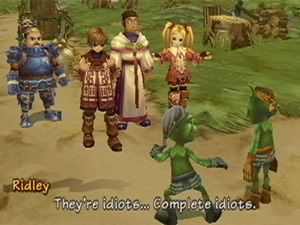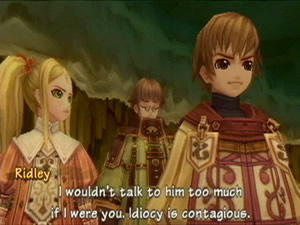A comedy of errors.
I used to think that Square-Enix, as a publisher, lacked balls. I was convinced of this by the wimpy way they kept releasing new versions of the same game, the naivet” of the themes contained in said games, their increasingly comfy relationship with Disney, and the consistent androgyny of their title characters. The once-dominant daddy of RPG monsters like Final Fantasy, Vagrant Story and the Chrono series has recently focused on hooey like the anemic Fullmetal Alchemist and the bland Musashi: Samuari Legend. Their bite was lost forever.
Then Radiata Stories dropped into the office and almost proved me wrong. Retarded in some ways and brilliant in others, this action/RPG is more mature than its infantile siblings at the cost of some really unsightly blemishes. While it tells a decent story populated with charming characters, it makes a lot of rookie mistakes and is absurdly willing to let you completely waste your time.
You play the obnoxiously named Jack Russel (no relation to the terrier, we hope), a teenage boy determined to follow in his late father’s footsteps by joining the revered Radiata Knights. Jack gets in and promptly gets fired for dubious reasons, at the heart of which are the main mysteries of the game. He moves on to a rough warrior’s guild and eventually gets sucked into a war between humanity and the fantastical races (elves, dwarves and goblins), the cause of which also relates to Jack’s untimely dismissal from the knights.
As the realm divides into warring factions, so does the plot. You have to pick a side, a choice that will affect the rest of the game. Either way, you’ll be forced into battle against good characters for bad reasons, setting up moral dilemmas that can’t simply be reduced to right and wrong. With such weighty, paradoxical predicaments, you’d expect the game to become overly heavy and melodramatic. That’s where Jack Russell comes in – the kid is fearless, aggressive, competent and not afraid to be an a-hole. He’s a good hero surrounded by an equally charming and funny supporting cast.
The only Square games to rival Radiata Stories in this regard are Chrono Trigger and Chrono Cross. In fact, Radiata Stories is similar to those gems in that it gives you dozens of characters to discover and tinker with. Every NPC in the game has a routine, such as going to work, going to a bar with a friend and then going home. Most of the interesting looking ones have problems, and if you help them solve their mess, they’ll become your friend and can be added to your party at any time. By the end of the game, you will have met dozens of interesting characters and fought alongside or against most of them.
Still, it’s easy to waste your time trying to befriend people who aren’t interested. I wasted a half hour following some girl in a Viking hat trying to figure out what I had to do to get her in my party and all she did was walk me in circles. Story of my life, I tell ya.
If she had simply said “You’re not powerful enough to be my friend” from the get-go, I could have saved thirty minutes. Instead, I let her and the game lead me on like a dope. This is an instance of Radiata Stories’ first major misstep – the game doesn’t take nearly enough responsibility for your enjoyment. It’s irritatingly vague in almost all of its instructions, leaving you to haplessly bark up the wrong tree when it could easily be more specific.
This especially goes for quest instructions. “Search the sewers.” “Find Natalie in Radiata Castle.” “Kill the rock-eating lizards in the cave.” Ah, of course. The sewers are a damned labyrinth and the game lacks a mini-map system to help you keep track of where you’ve been. Radiata Castle is even worse, with more rooms than a Motel 6, and you’ll have to check them all looking for this or that NPC. Every time you go through a door to check a room you get a tiny loading screen, and you’ll go through dozens trying to deliver letters and complete other lame delivery quests.
Nothing is more irritating, though, than being told to kill the lizards in the cave. I head to this cave, kill a bunch of enemies and find my way to a big open chamber that looks perfect for a boss fight…but there’s no boss. I figure I forgot some important detail in the Dwarf’s instructions, except that there’s no way to check without running all the way back to the little bastard since the game lacks a quest log. I eventually found the critters I was looking for in a different cave, but the vague instructions minus a useful map or log made this simple quest into a dire trial of my patience.
 It gets worse. A janky Save system and retarded Escape mechanic can easily combine to screw you out of several hours.
It gets worse. A janky Save system and retarded Escape mechanic can easily combine to screw you out of several hours.
The only way to escape from a battle is to purchase ‘escape balls.’ Run out and you’re stuck in combat. Saving can only be done at ‘save flags’ haphazardly strewn about the world. Put these two together and you’re in deep dung.
The horror experienced when you find yourself in a fight you can’t win, knowing you haven’t saved since you were level 1, is incredible. You can run from foes within the fighting area, leading your enemies in circles indefinitely, but at some point you have to give in and let them kill you, because there is nothing else you can do. It’s akin, psychologically, to slowly drowning.
Speaking of things that aren’t fun, the game’s core real-time combat system is terrible. You’ll encounter a surprising amount of depth as you acquire new weapons, learn new moves and discover that you can then combine these into custom combos, but the AI is so exploitable it’s absurd. If you use a weapon long enough, no matter what type it is, you’ll gain a knockdown attack. In a one-on-one fight – of which there are thousands – you can knock your opponent down, let them get up, knock them down repeat indefinitely for the most wack battles in the history of gaming. Brace yourself for some crummy handheld video footage.
The real problem is that any individual in the game can be challenged to a fight if you simply kick them. Kicking, by the way, replaces the generic “Search” function found in every other Square RPG. If you kick inanimate objects, neat stuff might fall out. If you kick people, they’ll fight you, and if you win you get experience and money. So the world is literally full of people to fight, but the battles always boil down to what you saw in the video. Radiata Stories is literally bursting with opportunities to get in some of the worst fights ever.
Things get a little better when you’re out in the world questing, because you’re usually accompanied by a group of friends who will fight by your side, listen to commands you give them, and follow basic formations (called ‘links’) for coordinated destruction.
Every time you or a squad-mate lands a hit on an enemy, it adds a point to your ‘Volty gauge’, which can charge up to 100 points. This is basically an all-purpose power meter; nearly everything cool you and your team can do depends on this.
Simple commands, such as “You, heal So and So” cost next to nothing, while the “Circle Song” costs twenty volty points and restores some HP to all party members. Though the combat still boils down to endlessly tapping the Circle button, at least the squad mechanics lend some depth.
 The enemies, while stupid, are well designed. There are all sorts of monster snakes, weird krakens and giant wolves to dispatch, even if the critters don’t seem to match their environments. You may not know why rabid monkeys and haywire robots are hanging out together in caves, but you know they aren’t up to any good.
The enemies, while stupid, are well designed. There are all sorts of monster snakes, weird krakens and giant wolves to dispatch, even if the critters don’t seem to match their environments. You may not know why rabid monkeys and haywire robots are hanging out together in caves, but you know they aren’t up to any good.
In keeping with its schizophrenic nature, the game looks as pretty as a picture at times and as washed out as an old Polaroid at others. The designers used subtle touches of cel-shading to give the game its storybook feel, which is promptly abandoned during various environments. Lush outdoor areas give way to bland, flat dungeon interiors. There is no consistent standard here.
The audio range is equally crazy, lacking any concrete stylistic identity. Some of the music is great and catchy, while other tunes, such as the one that plays when you fight random NPCs, are incredibly irritating. Thankfully the voice-acting is fine, which is without a doubt the most important thing in a game like Radiata Stories.
Unfortunately, that’s not enough. Square-Enix manages to spin a good yarn and populate an interesting world full of fantastic characters, but a plethora of inexcusable design decisions threaten to unravel everything. Despite its promise, some serious growing pains prevent this adolescent from truly coming of age.
-
Excellent story
-
Huge amount of content
-
Terrible combat system
-
Awful quest system
-
Few save points
-
Stop wasting my time











